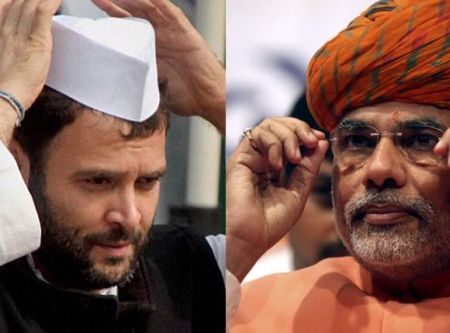 | « Back to article | Print this article |
 Tuesday’s contrasting speeches -- one by Rahul Gandhi in New Delhi and the other by Narendra Modi in Jaipur -- set the tone for the mother of all political battles, reports Anita Katyal.
Tuesday’s contrasting speeches -- one by Rahul Gandhi in New Delhi and the other by Narendra Modi in Jaipur -- set the tone for the mother of all political battles, reports Anita Katyal.
When Congress Vice-President Rahul Gandhi took the floor at a Delhi function on Tuesday -- where he handed over documents offering ownership rights to residents of the capital’s resettlement colonies -- he made a calculated attempt to change the political narrative in his party’s favour by highlighting the United Progressive Alliance government’s recently-enacted landmark legislation like the Food Security Bill and the Land Acquisition Bill.
In sharp contrast, Gujarat Chief Minister Narendra Modi, who heads the Bharatiya Janata Party’s poll campaign, launched yet another attack against the Congress party’s 'first family' and the ruling coalition’s poor track record in governance while addressing a rally in Jaipur.
Tuesday’s contrasting speeches set the tone for the upcoming battle between the Congress and its main challenger, as the two parties gear up for the year-end assembly elections to be followed by next year's Lok Sabha election.
While the Congress will attempt to alter the political discourse by underlining the flagship programmes it has launched for the poor and underprivileged, the BJP will keep the focus on the UPA government’s shortcomings.
As the election campaign picks up in real earnest in the coming months, a beleaguered Congress will focus increasingly on the land and food bills in the hope that the promise of subsidised food grain and better compensation to farmers whose land is acquired will deflect attention from issues like corruption, escalating prices and the ailing economy which have come to define the Congress-led UPA government.
It was precisely for this reason that the Congress went out on a limb to push for the passage of the key legislation during the monsoon session of Parliament. Congress leaders believe the legislation will resonate with the electorate like Indira Gandhi’s 'Garibi Hatao' slogan did at the 1971 general election.
“These bills will wash away all the scams and other negatives about this government,” gushed a senior Congress minister, while another senior leader was cautious in his response.
“The legislation are undoubtedly very powerful weapons, its political fallout will be determined by how we are able to use this weapon and present it effectively to the people,” the latter leader remarked.
The Congress began the process of hard selling its 'game-changer' programmes first with party President Sonia Gandhi’s speech in the Lok Sabha on the Food Security Bill where she enumerated the UPA government’s various rights-based legislation.
This was followed up by Rahul Gandhi’s speech in Delhi on Tuesday. A repeat performance is expected when he addresses a rally near Udaipur on Wednesday.
The issue nagging the Congress is whether it can actually hypnotise the voter into forgetting the current grim economic scenario at a time when the prices of essential commodities continue to rise.
The ongoing communal violence in Uttar Pradesh has added to the party’s woes as such incidents will only impede its efforts to set the agenda in this election season.
For the moment, the Congress can draw solace from the fact that it was able to force a reluctant BJP to lend its support in the passage of these two crucial bills.
Having rolled the dice, the Congress was well aware that despite deep reservations in the BJP about these legislations, it had little option but to vote in its favour as not doing so would have been tantamount to political harakiri.
Now that the laws have been enacted, a down and out Congress party has a saleable issue to take to the people in the hope that it will counter the rising resentment against the UPA government and translate into votes for the party.
Congressmen also realise that mere rhetoric will not work wonders; the electorate is far better informed than it was 42 years ago. The government will have to ensure that the subsidised grain reaches the common man and that s/he gets the enhanced compensation provided for in the new Land Acquisition Bill.
Sonia Gandhi’s decision to choose populism over growth may not eventually carry the day if the economy continues to totter. To that extent, the Congress chief’s socialist moorings have to be effectively intertwined with the efforts of the government’s chief economic mangers -- Prime Minister Manmohan Singh and Finance Minister P Chidambaram -- to put the economy back on track.
The prime minister and Chidambaram were not particularly enthused by Sonia Gandhi’s insistence on going ahead with the food and land bills at a time when the country is witnessing an economic downturn, but the two leaders had no choice but to go along with her decision.
It was only to be expected that politics would take precedence over economics in an election year.
Having lost the support of the middle classes, which had cheered lustily for Manmohan Singh in the UPA’s first term when the economy was booming, Sonia Gandhi realised that the Congress party’s best bet is to consolidate its traditional support base among the poor and rural masses.